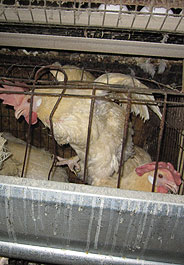
Every time I reviewed the footage from The Humane Society of the United States' latest undercover farm animal investigation, I was literally nauseated by it. Today, we released the footage to the press and the public, and at a press conference in Des Moines, Iowa, I narrated what was happening to egg-laying hens caught up and suffering on massive factory farm operations. It is hard to believe that this type of animal mistreatment still occurs in 2010. In fact, it is not only legal to treat animals in this appalling way, but it has become a norm in the industry. The top egg producers in the nation are treating animals in ways that are simply unconscionable.
 This investigation focused on two of the three largest egg producers in the United States -- Rose Acre Farms and Rembrandt Enterprises. An HSUS undercover investigator spent about a month at four Iowa egg production facilities that confined about 10 million birds. The investigator documented the close confinement and severe overcrowding of millions of birds in tiny battery cages, an enormous number of dead birds in cages amidst the living, rodents and insects crawling over hens in cages, hens with their legs or other body parts caught in the wire caging, and other signs of visible and unmistakable illness or distress, including prolapsed uteruses and large, bulging sores and infections. He documented reckless and inhumane handling, such as pullets (young hens) and adult laying hens being pulled out of cages or jammed into cages or a mobile gas chamber. Some animals escaped from their cages and perished in manure pits down below them. One plant worker told our investigator that the ammonia concentration in the air is so high that some of the birds go blind from the effects.
This investigation focused on two of the three largest egg producers in the United States -- Rose Acre Farms and Rembrandt Enterprises. An HSUS undercover investigator spent about a month at four Iowa egg production facilities that confined about 10 million birds. The investigator documented the close confinement and severe overcrowding of millions of birds in tiny battery cages, an enormous number of dead birds in cages amidst the living, rodents and insects crawling over hens in cages, hens with their legs or other body parts caught in the wire caging, and other signs of visible and unmistakable illness or distress, including prolapsed uteruses and large, bulging sores and infections. He documented reckless and inhumane handling, such as pullets (young hens) and adult laying hens being pulled out of cages or jammed into cages or a mobile gas chamber. Some animals escaped from their cages and perished in manure pits down below them. One plant worker told our investigator that the ammonia concentration in the air is so high that some of the birds go blind from the effects.
At Rembrandt's Thompson, Iowa, facility, there are 18 laying hen houses, with about 300,000 birds in each facility. These are unbearably overcrowded bird factories, and there are not enough workers to help them if something goes wrong, such as a leg or wing, or even their uterus becoming stuck in the wire caging. There are virtually never veterinarians to attend to sick birds. It is population-level management, and one worker claimed that for a two-week period, they pulled out 5,000 dead birds from one barn every day. That's 70,000 birds dead within two weeks at just one of the barns -- and that's just part of the process for these facilities. It's an unwelcome outcome, but nevertheless an acceptable one at these facilities.
The battery cage confinement system is inherently inhumane. It not only poses insurmountable animal welfare problems because of the lack of space and restriction on basic behavior, but this latest HSUS investigation also reveals that the inhumane handling, the wire flooring, and the massive collection of waste are also fundamental problems for this system. There are just too many birds in one facility to properly care for.
This post originally appeared on Pacelle's blog, A Humane Nation.
